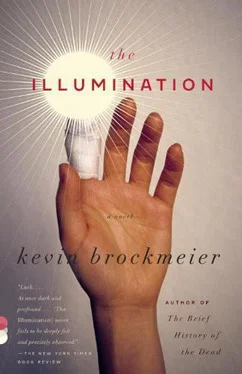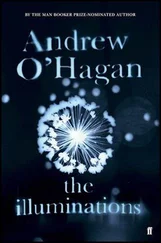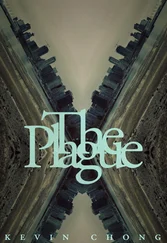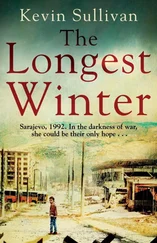That day on the playground was like every other day. After Todd said “Chuckie boy,” he said, “Count on it.” He said, “I’ll wring that scrawny neck like a chicken’s.” He said, “When you least expect it, there I’ll be.” Then he slapped Chuck, softly, like a gangster, and left.
For the rest of the day, Chuck’s elbow felt tight. He kept stretching his arm, hoping the joint would pop. The skin rippled slightly where Todd Rosenthal had grabbed him. It was nearly impossible for him to scratch his back.
That afternoon it rained and then gave way to sunlight. The parking lot reflected the sky from a thousand puddles. The basketball hoops dripped onto the pavement like shining halos. At three-thirty, Chuck’s mom picked him up in the car. She took the fast way home, speeding along the highway. The road was drenched with sheets of blue and white. At fifty miles per hour, the seats began to shake. Chuck’s teeth chattered in his mouth like a wind-up toy. His mom honked and shouted “Moron!” at the other drivers. Her voice shivered as she sang along with the radio. They stopped for gas, then groceries, then finished the drive. The rain had washed the dust out of the gutters. The bricks of Chuck’s house were dyed dark with water. They were stacked together like crispy double vanilla sugar wafers. He had not been caught licking them in several months. That was back in February, before the Illumination began. His pretend dad had come storming across the yard, furious. He had promised to whip Chuck, hard, unless he stopped. He couldn’t keep sticking crap like that in his mouth. Seriously, was he that messed up in the goddamned head? He needed to grow the hell up and quit it. Chuck knew the rule by heart: no tasting the bricks. But sometimes, rule or no rule, he still wanted to. It was one more problem he could not figure out.
Chuck left his mom alone to unpack the grocery bags. He dropped his backpack on the floor of his bedroom. A bullfrog mirror hung on the back of his door. Chuck saw himself staring out from inside its shining mouth. The finger-shaped bruises on his elbow were purple and silver. There were five of them—one, two, three, four, five. Five times two was ten, so everything still fit together. He sat at his desk and took out his notebook. The stories he had heard about fifth grade were true. He had lots of homework—too much, in his opinion. Nearly every day he had some new assignment to complete. One night he might have to draw a plant cell. The next he might have to answer questions about Ethiopia. Or color and label the four chambers of the heart. Or fill out the tiny squares of the multiplication table. Or write a paragraph about Benjamin Franklin flying a kite. Today it was time to study for his vocabulary quiz. He would have to spell the words, then define them. Evaporate, illiteracy, physician, membrane, diminutive, fragile, majestic, chandelier, sabotage, approximately . They were longer than most of the words he knew. He practiced using them in a sentence to memorize them.
As soon as the sun rises, the water will evaporate .
I was sick, so I went to see the physician .
There is nothing good about illiteracy, so learn to read .
Fridays and Saturdays were like a diminutive summer or Christmas. For approximately two days, Chuck could do whatever he wanted. His parents usually let him stay up late with them. They sat side by side in the fragile TV light. They slurped beer and whispered and flirted with each other. They let their fingers walk quietly up each other’s legs. Meanwhile, Chuck colored pictures, ate honey-roasted peanuts, and drank soda. A membrane of Cherry Coke trembled above the glass’s rim.
One Friday, he decided he would draw a majestic rainbow. An actor was on TV accepting a lifetime achievement award. His lungs shone with cancer through his tuxedo like chandeliers. Chuck looked down and tried to concentrate on his drawing. One by one, he used all sixty-four of his crayons. He was getting ready to shade in the last section. He took his favorite color, cornflower blue, from the box. But his pretend dad snatched the sheet of paper away. He waved it in the air like an American flag. He said, “Bedtime for Bonzo!” and made a chimpanzee noise.
There was that feeling of miniature needles in Chuck’s eyes. He hated crying so easily, but he couldn’t help it. His rainbow was only one curve short of being finished. His pretend dad had ruined the drawing with his sabotage. Now, like always, he was angry at Chuck for crying. Underneath his breath, he said, “For the love of God.”
Chuck tried to stop sniffling, but it did no good. His bears and his elephant were waiting on their bench. They were frightened and lonely and wondering where he was. He ran to his bedroom in his socks and pajamas. After he shut the door, he heard his parents whispering. His pretend dad said, “What’s the use in me trying? I could be Mr. Perfect, and it still wouldn’t matter.”
He said, “Face it, we’ve raised one Grade A brat.”
He said, “You try to make a single monkey joke—”
Chuck’s mom sighed and cleared her throat to interrupt him. “If you really attempted to figure him out, you could. It’s not like you have to be Sherlock-frigging-Holmes. You want to know how to put him to bed? There are three different ways to do it,” she said. Chuck pictured her extending her fingers as she listed them. “ ‘Chuck Carter, Chuck Carter, it’s time to sleep till morning.’ ‘Your stuffed animals are waiting for you to say goodnight.’ And then, if he absolutely won’t listen, there’s another one. ‘I want your head on that pillow in five minutes.’ ”
His pretend dad smacked the table and asked, “But why?”
“I can’t explain why, honey—I just know it works.”
“You’re saying he’ll cry whenever he doesn’t get his way.”
“I’m saying what harm does it do to humor him?”
“The world will eat him alive when he grows up.”
“That doesn’t mean that we should eat him alive, too.”
Chuck put himself to bed and listened to them argue. He lay there for a long time before falling asleep. He dreamed he was riding the glass elevator into space. The Earth disappeared beneath the clouds and a billion stars. He was either Superman or Batman or the Green Lantern.
The diary Chuck took still shone like a wounded animal. Sometimes he liked to sleep with it under his pillow. The light was sad and bright and comforting to him. In the morning, he would wake up inside its glow. Some of the book’s pages were bent into a wave. Chuck tried everything he could imagine to press them flat. He took his shoes off and stood on the cover. He put it beneath the leg of his dresser overnight. He piled all his other books on top of it. He even ran it under the heat of an iron. He thought he felt the curve loosening beneath the weight. Then his nose prickled with the smell of something burning. A fishing line of black smoke lifted into the air. An orange spark crawled over the paper like a ladybug. When he blew, it turned into a dozen smaller sparks. They smoked and vanished, leaving brown pinholes in the page. Chuck was worried that he had only made things worse. The book was still kinked, even after all his work. He had stepped on it, scorched it, weighted it down. What if it believed he was angry—was punishing it? He picked it up and hugged it to his chest. He thought, I didn’t mean it, I didn’t mean it . The light was as bright as it had ever been.
It was a cool, cloudless day in October: jacket weather. The sheets drying in the backyard were rippling and swaying. Some cardinals were chasing each other through the magnolia’s branches. Shortly after lunch, Chuck took the diary outside with him. The sheets were like a narrow room without a ceiling. He lay there thinking and teasing the grass into threads. He could see a gray squirrel twitching its bushy tail. He could see airplanes drawing white chalk-lines in the sky.
Читать дальше












